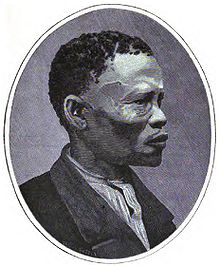- Oorlam people
-
The Oorlam people (also known as "Orlaam", "Orlam", "Orlams", or "Orlamse Hottentots") are a subtribe of the Nama people, assimilated after their migration from the Cape Colony (today, part of South Africa) to Namaqualand and Damaraland (now in Namibia). Oorlam clans originally were formed by mixed-race descendants of indigenous Khoikhoi and slaves from Madagascar, India, and Indonesia.[1]
When Oorlam communities migrated northward to Namaqualand from the Cape Colony beginning in the late eighteenth century, they occupied places earlier occupied by the Nama. They came partly to escape Dutch colonial conscription, partly to raid and trade, and partly to obtain herding lands.[2] Some of these emigrant Oorlams (including the band led by the outlaw Jager Afrikaner and his son Jonker Afrikaner in the Transgariep) retained links to Oorlam communities in or closer to the borders of the Cape Colony. In the face of gradual Boer expansion and then large scale Boer migrations away from British rule at the Cape, Jonker Afrikaner brought his people into Namaqualand by the mid-nineteenth century, becoming a formidable force for Oorlam domination over the Nama and against the Bantu-speaking Hereros for a period.[3]
Emerging from populations of Khoikhoi servants raised on Boer farms, many of them having been orphaned and captured in Dutch commando raids, Oorlams primarily spoke a version of Dutch or proto-Afrikaans and were much influenced by Cape Dutch colonial ways of life, including technological adoption of horses and guns, use of European-style clothing, and Christian worship.[4] After two centuries of assimilation into the Nama culture, many Oorlams today regard Khoikhoigowab (Damara/Nama) as their mother tongue. The distinction between Namas and Oorlams has gradually disappeared, so that today they are regarded as a single ethnic group, despite their different origins.[5]
Clans
The Orlam people comprise various subtribes, clans, and families. In South Africa the Griqua are an influential Oorlam group.
The clans that migrated across the Oranje into South-West Africa are, in order of their time of arrival:
- The ǀAixaǀaen (Orlam Afrikaners), the first group to enter and permanently settle in Namibia. Their leader Klaas Afrikaner left the Cape Colony around 1770. The clan first built the fortress of ǁKhauxaǃnas, then moved to Blydeverwacht, and finally settled at Windhoek.[6]
- The ǃAman (Bethanie Orlam) subtribe settled at Bethanie at the turn of the eighteenth century.[7]
- The Kaiǀkhauan (Khauas Nama) subtribe formed in the 1830s, when the Vlermuis clan merged with the Amraal family.[7] Their home settlement became Naosanabis (now Leonardville), which they occupied from 1840 onward.[8] This clan ceased to exist after military defeat by Imperial German Schutztruppe in 1894 and 1896.[9]
- The ǀHaiǀkhauan (Berseba Orlam) subtribe formed in 1850, when the Tibot and Goliath families split from the ǃAman to found Berseba.[7]
- The ǀKhowesin (Witbooi Orlam) subtribe was the last to take up settlement in Namibia. They originated at Pella, south of the Orange River. Their home town became Gibeon.[7]
Notes
- ^ "Slavery in the Cape". Institute for the Study of Slavery and its Legacy – South Africa. http://slaveryinstitute.wordpress.com/slavery-in-the-cape/. Retrieved 8 July 2010.
- ^ J. D. Omer-Cooper, History of Southern Africa (Portsmouth, NH: Heinemann, 1987), 263; Nigel Penn, "Drosters of the Bokkeveld and the Roggeveld, 1770-1800," in Slavery in South Africa: Captive Labor on the Dutch Frontier, ed. Elizabeth A. Eldredge and Fred Morton (Boulder, CO: Westview, 1994), 42; Martin Legassick, "The Northern Frontier to ca. 1840: The rise and decline of the Griqua people," in The Shaping of South African Society, 1652-1840, ed. Richard Elphick & Hermann Giliomee (Middletown, Connecticut: Wesleyan U. Press, 1988), 373-74.
- ^ Omer-Cooper, 263-64.
- ^ Legassick, 368-69; Penn, 42.
- ^ Malan, Johan S (1998) (in German). Die Völker Namibias [The Tribes of Namibia]. Windhoek, Göttingen: Klaus Hess. pp. 120–121.
- ^ Dierks, Klaus. "Biographies of Namibian Personalities, A". http://www.klausdierks.com/Biographies/Biographies_A.htm. Retrieved 24 June 2010.
- ^ a b c d Dedering, Tilman (1997). Hate the old and follow the new: Khoekhoe and missionaries in early nineteenth-century Namibia. 2 (Missionsgeschichtliches Archiv ed.). Franz Steiner Verlag. pp. 59–61. ISBN 9783515068727. http://books.google.com/books?id=anD2mOjDdMIC&pg=PA59. Retrieved 7 February 2011.
- ^ Dierks, Klaus. "Biographies of Namibian Personalities, L". http://www.klausdierks.com/Biographies/Biographies_L.htm. Retrieved 14 January 2011.
- ^ Shiremo, Shampapi (14 January 2011). "Captain Andreas Lambert: A brave warrior and a martyr of the Namibian anti-colonial resistance". New Era. http://www.newera.com.na/article.php?articleid=36891&title=Captain%20Andreas%20Lambert:%20%20A%20brave%20warrior%20and%20a%20martyr%20of%20the%20%20Namibian%20anti-colonial%20resistance%20%2818.
Captains of the Orlam Orlam Afrikaner
ǀAixaǀaenOude Ram Afrikaner (before 1760) · Klaas Afrikaner (1760–around 1800) · Jager Afrikaner (around 1800–1823) · Jonker Afrikaner (1823–1861) · Christian Afrikaner (1861–1863) · Jan Jonker Afrikaner (1863–1889) · Hendrina Afrikaner (2004–2011)
Berseba Orlam
ǀHaiǀkhauanDirk Isaak (before 1850) · Paul Goliath (1850–1869) · Jakobus Isaak (1873–1892) · Diederik Goliath (1894–ca.1900) · Johannes Christian Goliath (ca. 1900–1925) · Andries Goliath (1925–1933) · Diederik Ruben Goliath (1933–1938) · David Vries (1938–1956) · Edward Isaak, Jr. (1938–1959) · David Christian Goliath (1959–1970s)1 · Diederik Isaak (1959–1970s)2 · Stephanus Goliath (1976–2010)1 · Thomas Karools (2010–2010)1 · Johannes Fleermys (?–?)2 · Johannes Isaak (2011–)2,3
1of the faction supporting SWAPO; 2of the faction supporting DTA; 3leader of the reunified group;Bethanie Orlam
ǃAmanKobus Frederiks (1804–1824) · Jan Frederiks (1824–1846) · Josef Frederiks I (1825–1842) · David Christian Frederiks (1842–1880) · Josef Frederiks II (1880–1893) · Paul Frederiks (1893–1906) · Eduard Frederiks (1916–1922) · Josef Frederiks III (1922–1938) · Simon Frederiks (1938–1977) · David Frederiks (1984–)Khauas Nama
KaiǀkhauanAmraal Lambert (until 1864) · Andreas Lambert (1864–1894) · Eduard Lambert (1894–1896)Witbooi Orlam
ǀKhowesinKido Witbooi (until 1875) · Moses Witbooi (1875–1888) · Hendrik Witbooi (1888–1905) · Isaak Witbooi (1905–1928) · David Witbooi (1928–1955) · Hendrik Samuel Witbooi (1955–1978) · Hendrik Witbooi, Jr. (1978–2009)Categories:- History of Namibia
- Ethnic groups in Namibia
- Ethnic groups in South Africa
- Multiracial affairs
Wikimedia Foundation. 2010.

